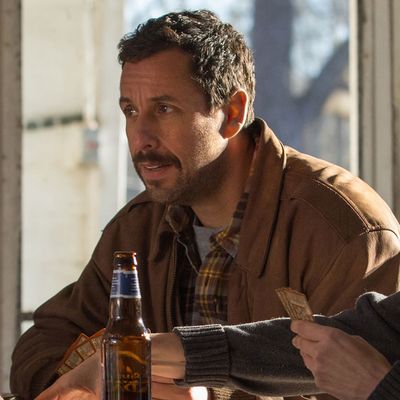
As if the Jews havenÔÇÖt been through enough, every winter we must forlornly scan our DVD shelves and streaming libraries in search of something that isnÔÇÖt there. When the Hanukkah spirit strikes, the observant will sometimes look for a fitting movie in the same way that a hungry person will repeatedly open a refrigerator they know to be empty. WeÔÇÖve got Eight Crazy Nights, The Hebrew Hammer, and a handful of one-off TV episodes, but beyond that, bupkus. (The reasons for this are multiple and complicated, but it mostly boils down to ÔÇ£remember that we sufferedÔÇØ making for a somewhat less snappy catchphrase than ÔÇ£peace on earth, goodwill toward men.ÔÇØ) Available options slimmed to kicking it with the goyim or muscling through the port-a-potty scene in Adam SandlerÔÇÖs animated abomination yet again, many Jews have nowhere to turn. Slavery, genocide, and now this?
The sheer paucity of Hanukkah movies means that we may have to move the goalposts just to find something quality to watch. The criteria neednÔÇÖt include a literal engagement with the holiday itself, only the sense of being apropos for the occasion. Jewry needs its Jack Frost, the Rankin-Bass special lumped in with Christmas fare despite being a nonspecific wintertime fantasy. Mere proximity will do.
The good news is that 2017 has delivered unto the Jews a film worthy of the Hanukkah-movie mantle ÔÇö the only thing is that itÔÇÖs not set during Hanukkah. From the title on down, Noah BaumbachÔÇÖs caustic new comedy The Meyerowitz Stories (New and Selected) wears its heeb street cred on its sleeve. While each character has been individually shaded with fine strokes, the big, fractious Meyerowitz clan falls into a lot of the classic portrayals of Jewish families. TheyÔÇÖre preoccupied with education and academic accomplishment, expert-level kvetchers, and noisily dysfunctional. Moreover, they hail from the Upper West Side of Manhattan; flanked by Barnard and Columbia to the north and Lincoln Center to the south, itÔÇÖs an epicenter of culture and identity for the Tribe.
The legend of Judah and the Maccabees subsisting for eight nights on a pittance of oil feels rather remote in the year 2017. To a modern Jew, the true story of Hanukkah is going home to spend time with the people who know you better than anyone ÔÇö and can use that knowledge to wage long, subtle campaigns of emotional warfare. The film sees the scattered Meyerowitzes convening for a retrospective of architectural designs from patriarch Harold (Dustin Hoffman), a withholding and insensitive father to three adult children. ThereÔÇÖs Danny (Adam Sandler), a failure in work as in marriage, an eternal disappointment to his elite father. Next down the line is his sister Jean (Elizabeth Marvel), the quiet one, often neglected while Dad fussed over the boys. Their half-brother is Matthew (Ben Stiller), a fabulous success in business who still managed to let down Harold by pursuing money and moving to Los Angeles. Getting them all under the same roof shakes loose deep-seated tensions that lead to shouting matches, destruction of property, and one hilariously pathetic slap fight. Is that not what Hanukkah is all about?
Even if itÔÇÖs not, few films capture the paradoxical dynamic of the typical Jewish family ÔÇö at once cruel and comical, full of sniping but rooted in affection ÔÇö with such specificity. Nobody lights the menorah during the film, but the attendant feelings of uneasy togetherness are still there. The filmÔÇÖs most penetrating insight might as well be the moral of Hanukkah: that even if they donÔÇÖt get along, siblings are the only people who can truly understand one another, because theyÔÇÖre the only ones who share the formative traumas of being raised by their parents. ItÔÇÖs a mitzvah.

